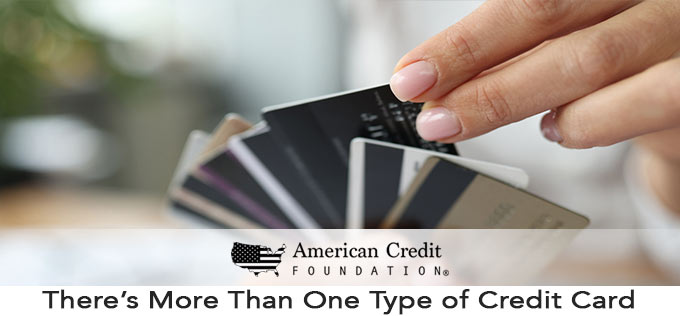
If you have more than one credit card, you hopefully reviewed your options before choosing the one(s) that best fit your lifestyle. But you might not have considered just how many different types of credit cards are on the market today.
Let’s consider the basics of 9 different types of plastic.
- Standard Credit Cards: These are the most “traditional” kind and likely what most people conjure in their minds when they think of a credit card. You have a pre-determined total credit limit, and you incur no interest as long as you pay off the balance in full by the due date every month.
- Rewards Credit Cards: These types of cards are very common and popular. They function the same as your traditional card, but they carry the added bonus of loyalty rewards that you earn with each set amount spent. Airline miles were one of the earliest rewards, but today retailers now offer virtually any reward.
- Business Credit Cards: If you run your own business, or if your employer has arranged it, you might have a good reason to use a credit card specifically for business owners and employees. These cards often offer promotions and rewards specific to your line of business. As an employee, the card might be in your name, but your employer is the owner and main responsible party.
- Limited-Purpose Credit Cards: Like rewards cards, these limited cards are intended for folks who make a lot of purchases from a certain retailer. The difference is you can only use them at the specific retailer that issued the card. Department stores and gas stations are common purveyors of limited-purpose cards.
- Student Credit Cards: Because it can be hard to build credit from scratch, some lenders offer “student” credit cards for younger consumers who aren’t quite in the job world yet. As their first credit card, these student cards tend to have more forgiving terms to help teach good credit card habits.

- Secured Credit Cards: Having a secured card means that the issuer requires a security deposit to open the account. The deposit is held while the account is open (think: a security deposit to rent an apartment) to reduce the risk for the card issuer. If you don’t have a substantial credit history, or if you have less-than-amazing credit, a secured credit card can be easier to qualify for.
The following three types of cards are typically lumped together with credit cards. They look like credit cards (many even carry a VISA, MasterCard, or American Express logo), and they even act like credit cards at a point of purchase. In reality, they are not credit cards in the true sense. (Hence the asterisks.)
- * Charge Cards: Some lenders – American Express was one of the earliest – issue charge cards rather than credit cards. Although the concept and function are the same, charge cards require you to pay the full balance every month. This is important to know in advance of making a substantial purchase: This is NOT a credit card that will enable you to pay it off throughout a few billing cycles.
- * Debit Cards: These cards are attached to your bank account. Although they might display a universally recognized logo that lets you use it for transactions at stores, you can only spend as much as you have in the bank. The funds come directly out of your bank account, and you won’t receive a bill at the end of the month.
- * Prepaid Cards: Again, despite their appearance, prepaid cards are not credit cards. You have to load them with cash (or buy them pre-loaded) before you can use them to make purchases. Although many can be re-loaded, they are essentially for one-time use. Once you reach a zero balance, the card no longer has any monetary value. But they’re almost like cash in that, if you lose them, you usually have no recourse to recoup any remaining funds.
Just because you have a credit card – or will be getting another one soon – doesn’t mean you should use it no holds barred. Remember, credit cards can be very useful tools, but only if you use them responsibly. Do you need advice on savvy credit card use? Please contact: American Credit Foundation to reach one of our friendly financial advisors who will gladly guide you through some tips and tricks to prevent credit card debt and other financial disasters.